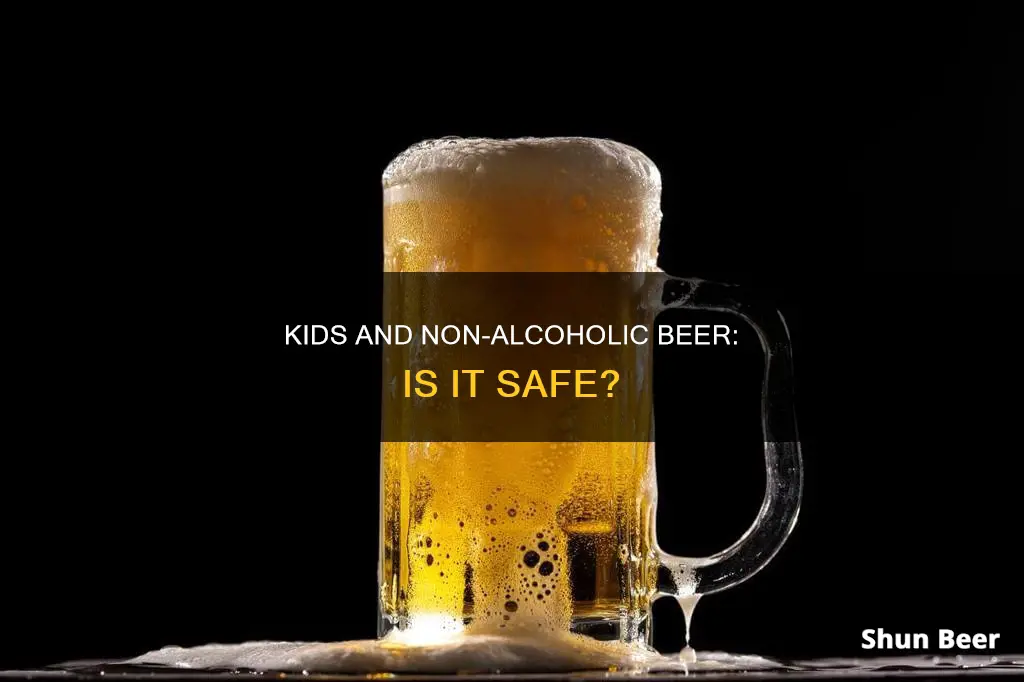
Actress Kristen Bell revealed that her daughters, aged 8 and 9, enjoy drinking non-alcoholic beer, sparking a debate about whether it is appropriate for children to consume such beverages. While some parents may view non-alcoholic beer as a healthier alternative to sugary drinks, others argue that it could normalise alcohol consumption and increase the risk of addiction. According to pediatricians, allowing kids to drink non-alcoholic beer may increase their interest in consuming alcoholic beverages and confuse them about the differences between alcoholic and non-alcoholic drinks.
What You'll Learn
- Non-alcoholic beer can increase the risk of addiction in children
- It can normalise drinking for kids
- It can be confusing for kids, who may not understand the difference between alcoholic and non-alcoholic drinks
- Non-alcoholic beer is not nutritious and contains high calories and carbohydrates
- It may not be the best option for people in recovery from alcohol addiction

Non-alcoholic beer can increase the risk of addiction in children
Non-alcoholic beer is a highly debated topic, especially when it comes to children. While some parents believe it is harmless, others argue that it can increase the risk of addiction in children and normalise drinking from a young age.
The Risk of Addiction
Non-alcoholic beer can contain up to 0.5% alcohol, and even this small amount can have an impact on children. Pediatricians warn that allowing children to drink non-alcoholic beer can increase their risk of developing an addiction later in life. This is because it normalises the consumption of beer and sends the message that drinking is acceptable. Research shows that teens who have consumed non-alcoholic beer are more interested in trying alcoholic beverages. By drinking non-alcoholic beer, children may be more likely to experiment with alcohol and potentially develop an addiction.
The Impact of Normalisation
When children are exposed to non-alcoholic beer, they may view it as a normal part of everyday life. This can lead to confusion about the difference between alcoholic and non-alcoholic beverages. Pediatricians warn that normalising the consumption of beer products can be harmful to children, who may not fully understand the consequences of drinking alcohol. Additionally, children who associate non-alcoholic beer with adults may be more inclined to try alcoholic beverages when their parents are not around. This sense of normalisation can increase the risk of underage drinking and its associated dangers.
Genetic and Environmental Factors
Both genetic and environmental factors play a significant role in the development of substance use disorders. For children who have a family history of addiction, introducing the ritual of drinking beer, even non-alcoholic beer, can be especially risky. The normalisation of alcohol use, combined with genetic predispositions, can increase the likelihood of addiction. In families with a history of addiction, it is crucial to have open and honest conversations about the dangers of alcohol and the importance of making healthy choices.
Long-Term Consequences
While the immediate impact of non-alcoholic beer on a child's health may be minimal, there are potential long-term consequences to consider. Allowing children to drink non-alcoholic beer can shape their relationship with alcohol as they grow older. The ritual of drinking beer, even without the alcohol content, can create a psychological association between beer and relaxation or socialisation. This association can increase the risk of addiction later in life, as individuals may turn to alcohol as a coping mechanism or a social crutch.
In conclusion, while non-alcoholic beer may not have the same intoxicating effects as regular beer, it can still pose risks to children. The normalisation of drinking, the potential for confusion, and the impact of genetic and environmental factors all contribute to the increased risk of addiction. It is essential for parents and caregivers to carefully consider the potential consequences before allowing children to consume non-alcoholic beer.
Beer and Protonix: Safe Mix or Health Risk?
You may want to see also

It can normalise drinking for kids
Actress Kristen Bell revealed that her daughters, aged 8 and 9, like the taste of non-alcoholic beer and have even ordered it at restaurants. While this has sparked a debate about the legality and health implications of non-alcoholic beer consumption by minors, one concerning aspect that has emerged is the potential for it to normalise drinking for kids.
Firstly, it is important to acknowledge that non-alcoholic beer is modelled to resemble regular beer in terms of smell, appearance, and taste. By allowing kids to consume these beverages, we may inadvertently be planting the seed that beer drinking is acceptable and even desirable. This could lead to a heightened interest in alcoholic beverages and potentially increase their risk of developing a substance use disorder. The very act of consuming a beer-like product can be confusing for children, who may struggle to differentiate between alcoholic and non-alcoholic options. This confusion could lead to dangerous situations where children accidentally consume alcoholic drinks, putting their health and safety at risk.
Additionally, normalising the consumption of beer-like products at a young age can have a psychological impact on children. It may trigger them to drink more beer as they get older and potentially develop unhealthy habits or addictions. Pediatricians and experts emphasise that non-alcoholic beer is designed as an alternative for adults who want to avoid the negative health consequences of alcohol, not for children. Introducing the concept of drinking beer, even in a non-alcoholic form, can send the wrong message to kids and increase their curiosity about alcohol.
Furthermore, allowing kids to drink non-alcoholic beer can also normalise the act of drinking itself. It may give them the impression that consuming alcoholic beverages is a common and acceptable part of adult life. This can shape their perceptions and attitudes towards alcohol, potentially making it seem more appealing or glamorous. While the intention may be to familiarise children with the taste of beer to reduce its allure, the opposite effect could occur, making it seem more intriguing and desirable.
Lastly, the availability and accessibility of non-alcoholic beer can also contribute to normalising drinking for kids. If children can easily obtain these beverages from stores or restaurants, it may reinforce the idea that drinking is a widespread and socially accepted behaviour. This can influence their beliefs and attitudes towards alcohol consumption, potentially lowering their guard against the risks associated with it.
Beer and Pap Smears: What You Need to Know
You may want to see also

It can be confusing for kids, who may not understand the difference between alcoholic and non-alcoholic drinks
Actress Kristen Bell revealed that her daughters, aged 8 and 9, like the taste of non-alcoholic beer and have even ordered it at restaurants. While this has sparked a debate about whether it is legal and appropriate for children to consume non-alcoholic beverages, the answer is not entirely clear-cut.
From a legal standpoint, the National Minimum Drinking Age (NMDA) Act of 1984 defines "alcoholic beverage" as drinks containing 0.5% or more alcohol by volume. Non-alcoholic beers typically fall below this threshold, with some having 0.0% ABV and others approaching the 0.5% limit. Federally, minors under the age of 21 can consume these beverages, even those with trace amounts of alcohol. However, state laws vary, with some states setting the minimum age for non-alcoholic beer consumption at 18 and others prohibiting minors from drinking it altogether.
Despite the legal allowances, experts advise against letting children consume non-alcoholic beer. Pediatricians caution that normalizing the consumption of beer products can be confusing for kids, who may not fully grasp the distinction between alcoholic and non-alcoholic drinks. Dr. Chloe Campbell, a pediatrician at Salem Hospital, warns that introducing children to non-alcoholic beer may increase their interest in trying alcoholic beverages. The potential for confusion and the risk of accidentally consuming alcoholic beer pose concerns for young individuals who may not fully understand the implications of alcohol consumption.
Additionally, non-alcoholic beer is not considered a healthy alternative for children. Dr. Lisa Ganjhu, a clinical associate professor of medicine, emphasizes that these beverages are intended for adults and not for children. She raises concerns about the potential long-term impacts, suggesting that pediatricians generally advise against allowing children to drink non-alcoholic beer. While non-alcoholic beer may have less alcohol content, it still contains high calories and carbohydrates, similar to sodas and other sugary drinks that are not recommended for children's health.
In conclusion, while non-alcoholic beer may be legally accessible to minors in some jurisdictions, experts advise against its consumption by children. The potential for confusion about alcoholic beverages, the risk of accidental consumption, and the lack of nutritional benefits contribute to the recommendation that non-alcoholic beer is not suitable for kids.
The Magic Behind Beer Engines: How Do They Work?
You may want to see also

Non-alcoholic beer is not nutritious and contains high calories and carbohydrates
Non-alcoholic beer is not a nutritious drink for children. While it may be legal for minors to consume in some places, it contains high levels of calories and carbohydrates, which can be unhealthy for kids.
Non-alcoholic beer is not a nutritious alternative to regular beer. While it may remove most of the alcohol content, it still contains a similar number of calories due to its high carbohydrate and sugar content. A cup of standard malt non-alcoholic beer contains 99 calories, with 19.1 grams of carbohydrates and almost no protein. In comparison, a pint of 5% regular beer contains around 239 calories.
The high carbohydrate content in non-alcoholic beer is due to the addition of sugar, which is added to improve the taste after removing the alcohol. As a result, non-alcoholic beer often contains more than twice the amount of carbohydrates as regular beer. This means that non-alcoholic beer is not a good option for people looking to reduce their calorie intake, as the added sugar can contribute to weight gain.
The high-calorie content in non-alcoholic beer can be especially unhealthy for children, as it can contribute to weight gain and increase their risk of developing health issues such as obesity or diabetes. Pediatricians and health experts recommend that children consume a balanced diet with a variety of nutritious foods and drinks to support their growth and development. Non-alcoholic beer, with its high calorie and carbohydrate content, does not fit this criterion and is therefore not a nutritious option for children.
In addition to the health concerns, allowing children to consume non-alcoholic beer can also send mixed messages about alcohol consumption. Pediatricians warn that normalizing the consumption of beer products can be confusing for kids, who may not understand the difference between alcoholic and non-alcoholic beverages. This could increase their interest in consuming alcoholic beverages and lead to dangerous consequences if they mistakenly drink regular beer. Therefore, while non-alcoholic beer may be legal for minors in some places, it is not a wise decision to allow children to consume it due to the potential health and behavioral risks involved.
Wine, Beer, and Mixing Drinks: What's the Verdict?
You may want to see also

It may not be the best option for people in recovery from alcohol addiction
Non-alcoholic beer has gained popularity as an alternative for those in recovery from alcohol addiction. However, this may not be the best option for people in recovery from alcohol addiction. While non-alcoholic beer typically contains little to no alcohol, it may still contain trace amounts, and the smell and taste can trigger cravings and emotional associations related to past drinking experiences. The act of consuming a beverage that resembles beer can trigger a placebo response, leading to sensations similar to those associated with alcohol consumption. This can be confusing for people in recovery, especially as the beer may still contain small amounts of alcohol.
The potential risks of non-alcoholic beer are important to consider for people in recovery from alcohol addiction. While it may be marketed as a safe alternative, the smell of beer alone may serve as a powerful relapse trigger for some. Research has shown that the smell of beer may be enough to trigger cravings and a subsequent relapse among individuals with alcohol use disorder. As such, it is generally recommended that those in recovery avoid anything that smells like alcohol.
Additionally, non-alcoholic beer may not be the best choice for people with a history of alcohol addiction due to the potential for normalization and increased risk of addiction. Introducing the ritual of drinking beer, even if it is non-alcoholic, can lead to the normalization of alcohol use, which may increase the risk of relapse. This is especially true for individuals with a genetic predisposition to substance use disorder.
The decision to consume non-alcoholic beer during recovery from alcohol addiction is a personal one and should be made in consultation with healthcare professionals or support groups. While it may be a helpful tool for navigating social situations where alcohol is present, it is crucial to assess individual triggers and emotional responses to make an informed choice that supports long-term recovery and well-being.
Beer and Pepto-Bismol: A Safe Mix?
You may want to see also
Frequently asked questions
Non-alcoholic beer is not 100% alcohol-free. Federal law states that non-alcoholic beer must contain less than 0.5% ABV. Pediatricians say that it's best not to let kids sip on non-alcoholic beer.
Generally, yes. Minors under the age of 21 can consume non-alcoholic beverages (even those that say "less than 0.5% ABV"). However, there are some states that only allow the drinking of non-alcoholic beer for those 18 and older, and some that prohibit it altogether.
In some states, minors can't buy non-alcoholic beer, but in certain states, that isn't the case or isn't regulated. As a rule of thumb, if your state allows minors to consume non-alcoholic beer, it also allows minors to purchase it.
Research shows that teens who have consumed non-alcoholic beer have more interest in consuming alcoholic beverages. It could also increase the risk of addiction and cause confusion, as kids may not understand the difference between alcoholic and non-alcoholic drinks.







